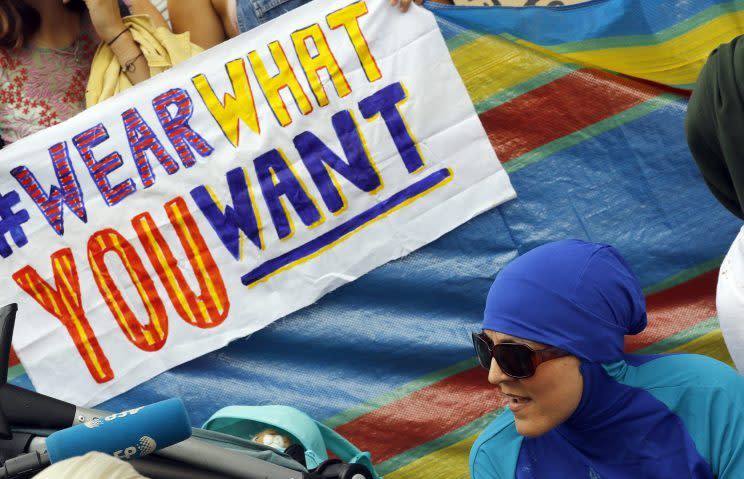Telling Women What to Wear Is Never Good for Women

Authorities in 15 French cities have banned the burkini, a modest swimsuit designed to be in accord with Islamic traditions of dress, following terrorist attacks in Nice. Justifications include security concerns, an adherence to “secularism,” hygiene issues, and charges that the burkini is a symbol of “women’s oppression.”
Photographs have since surfaced of women being forced to remove their clothing on the beach while onlookers jeer, triggering a heated debate in the news and on social media about a woman’s right to wear what she wants.
To American women, used to being targeted and judged when our clothing is deemed not modest enough, the burkini ban may feel like more proof that we’re damned if we do and damned if we don’t.
Related: One Businessman Is Fighting the Burkini Ban by Putting His Money Where His Mouth Is
Al Jazeera journalist Christina Cerqueira tweeted a black-and-white photograph of a police officer measuring the length of a woman’s bathing suit on a beach next to an image of a Muslim woman being forced to remove her burkini by police, with the caption: “This suit is too big. This suit is too small. When will it be OK for women to wear what they want? #burkini”
This suit is too big. This suit is too small. When will it be OK for women to wear what they want? #burkini pic.twitter.com/fi1w4jwVy1
— Christina Cerqueira (@cerqueic) August 23, 2016
Women’s clothing (and swimwear) has always been a battleground for those looking to “protect” them by impeding their agency. Victorian swimwear wasn’t much different from the burkini; women wore black knee-length dresses, stockings, and caps to swim. In 1907, Australian swimmer Annette Kellerman was arrested on a Boston, Mass., beach for wearing a one-piece suit that scandalously revealed her knees. When the bikini debuted in the 1940s (incidentally, invented by two French designers), many countries also banned it from their beaches, and the Vatican condemned the look.
This kind of clothing policing is particular to women. There have never been laws created or mass panic in response to what men choose to wear to the beach. Worse, the burkini ban targets Muslim women specifically — to make that point, people are circulating pictures on social media of French nuns on the beach in habits and loose dresses, presumably without issue.
French Nuns frolic wearing head scarf, and a full body outfit. Why aren’t Police forcing them to strip? #BurkiniBan pic.twitter.com/aMgTUIYmXA
— Jeff Campbell (@joxer) August 25, 2016
Related: The Bikini at 70: Everything You Need to Know About the Swim Style
Given that the burkini ban represents a full reversal from enforced modesty, many are concluding that the solution is just not telling a woman what she should be wearing, period.
“I think it’s ridiculous to ban a woman from wearing anything she wants. I don’t see how this helps women,” tweets influential editor and fashion icon Mickey Boardman.
#WearWhatYouWant
Outside the French Embassy: Liberty… Equality… Burkini #MyBodyMyRules #burkinigate #WTFFrance pic.twitter.com/b2AoIT6hpo— The New Arab (@The_NewArab) August 25, 2016
French Prime Minister Manuel Valls has explained his support for the burkini ban by saying that the garment contributes to “the enslavement of women.” But as this issue is making clear to the world, giving women fewer choices is rarely good for women’s rights. Policing women’s clothing and controlling women’s bodies does not make them more free. And blatant discrimination against Muslim women, many of whom are being put in harm’s way by France’s display of intolerance, is definitely not what feminism is about.
As Muslim feminist “Afra” tweeted yesterday, “forcing women to uncover is just as bad as forcing us to cover up.”
Follow us on Instagram, Facebook, and Pinterest for nonstop inspiration delivered fresh to your feed, every day.

